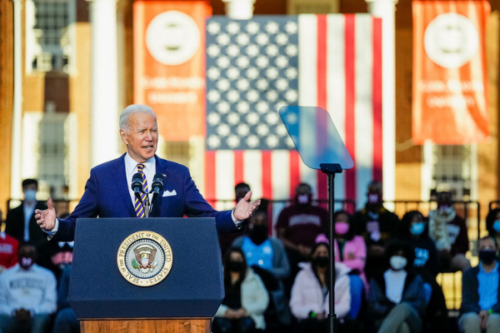
Podcast
Beyond MAGA: What Trump’s Coalition Really Looks Like
Drawing on new data from more than 10,000 Trump voters, this episode of Terms of Engagement unpacks the diverse constituencies behind the MAGA label.
Read the latest news, commentary, and analysis from the Ash Center.
Podcast
Drawing on new data from more than 10,000 Trump voters, this episode of Terms of Engagement unpacks the diverse constituencies behind the MAGA label.
Newest
Q+A
Maya Sen, an expert on the politics of the judiciary, comments on Breyer’s legacy, his likely replacement, and the Supreme Court’s rightward shift.
Media Release
Q+A
To discuss the filibuster and its impact on voting rights and the Senate, we sat down with Archon Fung, Winthrop Laflin McCormack Professor of Citizenship and Democracy at Harvard Kennedy School and the director of the Ash Center for Democratic Governance and Innovation’s Democratic Governance Program.
Video
We are in the midst of one of the most rancorous redistricting sessions in our country’s history. Partisan officials – mostly but not only in conservative legislatures – are using the drawing of new congressional, state and local election districts to amass disproportionate power for themselves. How successfully can this be resisted? Meanwhile, the many independent/nonpartisan commissions established in states in recent years were meant to help avoid this problem. Are they working to do so? If so, which ones are, which ones aren’t, where and why?
Join the Ash Center and Equal Democracy Project at Harvard Law School to learn about the state of redistricting in this moment, litigation that is occurring under a dramatically weakened Voting Rights Act, and how different redistricting commissions are faring, with:
Ben Schneer, Assistant Professor of Public Policy at the Harvard Kennedy School
Mitchell Brown, Counsel, Voting Rights, Southern Coalition for Social Justice
Colleen Mathis, former Chair of the Independent Redistricting Commission of Arizona
Cathy Duvall, Managing Consultant, Fair Representation in Redistricting
Moderated by: Nick Stephanopoulos, Harvard Law School
Q+A
LaChaun Banks, Ash Center Director for Equity and Inclusion, sat down with Khalil Gibran Muhammad, Ford Foundation Professor of History, Race, and Public Policy at Harvard Kennedy School and Director of the Institutional Antiracism and Accountability (IARA) Project, housed at the Ash Center, to discuss leading organizations to antiracist change and accountability.
Feature
George R. Greenidge. Jr. HGSE ‘96, Ash Center Democracy Visiting Fellow, doesn’t draw a line between scholarship and community advocacy, using both to combat gentrification and racial injustice.
Feature
South Bend, Indiana CIO Denise Linn Riedl MPP ’15 knows you can’t always code your way into a solution. With help from Juliahna Green MPP ’22, Riedl is expediting aid to residents in need by balancing people and process.
Assistant Professor of Public Policy Benjamin Schneer sat down with the Ash Center to discuss the once-in-a-decade reapportionment process now underway, the potential for partisan gerrymandering and its impact on politics nationwide.
Video
Confronting racism directly and building a fully inclusive democracy are completely intertwined. Two authors with strong history in the democracy movement have recently written forcefully and personally on the subject. Heather McGhee served as President of Demos before writing the New York Times bestseller The Sum of Us, and Theodore Johnson, after serving twenty years in the military, is the Director of the Fellows Program at the Brennan Center for Justice and the author of the just-published When the Stars Begin to Fall. Harvard Law Professor Guy Uriel-Charles engaged with them on their experiences, their arguments, and how they see the way forward.


